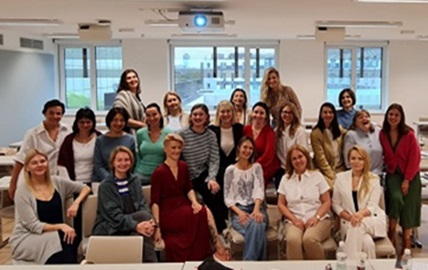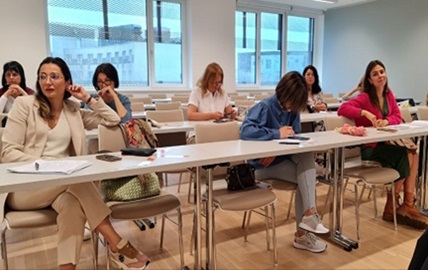Psychotherapeutic work with clients who were forced to move abroad because of the war. Recording
This seminar will be useful for:
- Psychoanalytic professionals and candidates
- Psychologists and psychotherapists of other approaches who work with adults and children with migration experience
- Mental health professionals, including doctors, social workers, and educators interacting with people who have experienced migration
- Lecturers in psychological disciplines
- Students in psychology-related fields
- Parents who have experienced migration
- Parents, relatives, and close ones who support those with migration experience
- Anyone interested in the topic of migration experience and the psychoanalytic approach in therapy

About the seminar:
Since February 2022, due to the war, more than 8 million Ukrainians have been forced to leave their homes and go abroad. The Ukrainian diaspora as a whole is significantly larger, and the current circumstances compel both newly arrived refugees and long-term residents abroad to seek help from psychotherapists.
How does migration affect the psyche? From a psychoanalytic point of view, migrants, regardless of age, experience a kind of “second adolescence,” as the adaptation process involves separation from the culture of origin and the formation of a new multicultural identity. How does this transition occur, and how can migrants be supported in maintaining mental balance?
These topics will be explored in detail during a seminar led by an Austrian psychotherapist of Ukrainian origin, who in recent years has gained significant experience working with Ukrainian migrants and has conducted over 70 psychoeducational seminars as a speaker and organizer, including for the Vienna Municipal Department for Integration and Cultural Diversity.
Participants will gain a unique opportunity to deepen their understanding of the psychological processes occurring in people who have experienced a forced change of culture and environment. They will learn methods for supporting such clients through different phases of adaptation and separation. Additionally, the seminar will provide practical tools for working with the emotional and cultural challenges that migrants may face, helping Ukrainian professionals to support their clients more confidently and effectively throughout this difficult journey.
Participation in the seminar includes receiving a certificate from Ukraine Sigmund Freud University (4 academic hours, 0.1 ECTS credits).
Who is the seminar facilitator:
Nataliia Tereshchenko — Austrian psychotherapist, psychologist, and doctoral candidate at Sigmund Freud University in Vienna, lecturer in the qualification advancement course at Ukraine Sigmund Freud University. She specializes in working with migrants. Member of the European Association for Psychotherapy (EAP) and the Austrian Association of Psychotherapists (VÖPP), and former secretary of the main EAP office (2016–2021). She holds bachelor’s and master’s degrees in scientific psychotherapy from Sigmund Freud University Vienna, specializing in psychoanalysis, psychoanalytic psychotherapy, and psychotherapy for infants, children, and adolescents.
She is also a recognized media expert, featured on ORF, OktoTV, Ö1 radio, and in publications such as Kronen Zeitung, The Gap, EU NEIGHBOURS, Süddeutsche Zeitung, and Freie Presse. She has 12 years of international living experience.
Lecturer

Lecture schedule:
What participants will gain from the training

- In-depth, modern knowledge of psychoanalytic theories on migration, transculturality, and their impact on personality development.
- Deep understanding of mental disorders commonly found among migrants and the challenges of adapting to new cultural and social conditions, with a special focus on Ukrainian migrants.
- An overview of transcultural psychotherapy approaches, their importance, and their specific role in working with adults and children who have migration experience.
- Practical knowledge of how to structure the therapeutic process for working with adult and child migrants, including adaptation of psychoanalytic techniques to meet the specific needs of various age groups.
- Review of international experience (in particular, Austrian and German psychotherapists) and examples of effective interdisciplinary collaboration with migrants.
- Detailed analysis of clinical cases in work with Ukrainian adult and child migrants, enabling examination of successful approaches to addressing psychological issues related to migration experience.
Student reviews
Feedback
If you have any questions, please contact us in a convenient way
Fields marked with (*) are mandatory.

 Вхід
Вхід



